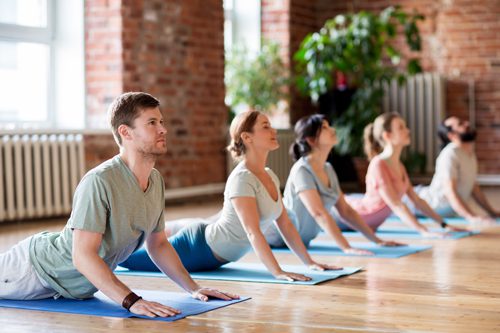 There are many health and wellness methods people use to prevent relapse after completing an addiction rehabilitation program.
There are many health and wellness methods people use to prevent relapse after completing an addiction rehabilitation program.
One popular activity is yoga, because it helps individuals explore the connection between mind, body, and spirit; and how that connection fosters positive self-image and the ability to reshape life.
The Give Back Foundation (GBF) reports that approximately one in three people in the United States are either dealing with drug or alcohol addiction, or are greatly impacted by the addiction of a loved one. A specialized program designed for people in recovery is the Yoga of 12-Step Recovery, supported by the GBF.
The mission of the GBF is to extend the outreach of research-based yoga practices and make them available to marginalized populations. In addition to the 12-Step Recovery program, this nonprofit organization promotes yoga programs for people with cancer, veterans, individuals in prisons systems, members of the military, and people working through eating disorders.
What Yoga Can Do for You
Yoga practice is no longer a mystical Eastern method of movement. In 2016, there were nearly 37 million yoga practitioners in the United States alone. Numerous medical studies support the practice of yoga as a way to reinforce mind-body wellness.
The American Osteopathic Association lists a number of benefits derived from a regular yoga practice, including:
- Less fatigue
- Improved sleep
- Increased flexibility
- Relief from chronic stress
- Reduced inflammation
- Enhanced mood through natural dopamine release
- Less joint pain
- Sharpened concentration
- Improved control over anxiety
- Relaxed mind
- Better connection with breath
People also see noticeable results from a regular meditation practice, including improved self-control, better self-confidence, and the ability to manage certain mental health issues more effectively, including anxiety and depression. Quite often, yoga and meditation are combined to form one session.
Yoga is also a wonderful tool to manage impulsive behavior, especially after brain chemistry was altered by drug or alcohol addiction. And some yoga instructors offer somatic healing therapy combined with yoga, which is a way for individuals to release psychological traumas from the autonomic nervous system through physical movement.
Yoga of 12-Step Recovery
Creator Nikki Myers developed Yoga of 12-Step Recovery (Y12SR) in 2003 after her personal journey of addiction. As a survivor of domestic violence and sexual assault, Nikki references herself as a recovering alcoholic and addict. In this interview with Gaiam’s program “Untangle,” she describes her remarkable journey.
She relapsed twice after substance abuse treatment, even with the aid of a 12-step program and yoga—just not simultaneously. She’s quoted on her website, “It was after the second relapse that I realized there had to be a union between the cognitive approach to addiction recovery offered by 12-step programs and the somatic approach to healing offered through yoga.”
Myers is now an addictions recovery specialist and yoga therapist. Her work with Y12SR is “a holistic model designed to address the physical, mental, and spiritual disease of addiction.” The program provides weekly meetings structured to help people find a safe place on the yoga mat to release trauma, while sharing the support and context of a 12-step program to undo the veil of ego, the “stinkin’ thinkin'” that affects the reality of how practitioners view the world.
The yoga concept of staying present and showing up on the mat every day mirrors the accountability of 12-step program and the intent of commitment. Y12SR practice, Myers believes, recognizes the powerful combination of somatic assistance from yoga movement and the cognitive initiatives of a 12-step program.
Instructors of Y12SR are yoga teachers, but also other professionals who deal with addiction behavior, such as social workers, mental health experts, and even probation officers. Through intensive training, potential instructors learn the sources of addictive behavior; the science of yoga and 12-step programs; and sustainable practices to enable individuals to experience long-term recovery, self-regulation, and the unity of mental, physical, and spiritual wellbeing. Instructors are also required to attend further training in order to work with people who are struggling emotionally; create inclusive and safe spaces for people affected by addictive behavior; and cultivate a network of professionals who and institutions that can assist Y12SR participants.
As of 2017, there are more than 350 Y12SR meetings happening across the United States, led by certified instructors. The meetings are open to everyone, regardless of yoga ability, and designed to reinforce an individual’s existing recovery practices or assist someone affected by a loved one’s addiction. Each meeting is donation-based. Meetings may be held in community centers, treatment facilities, or yoga studios.
Find a Y12SR meeting near you.
Explore Yoga as a Wellness Option
If you don’t have a Y12SR program nearby, there are still options available to you.
- Consider contacting a Y12SR leader to learn about comparable programs in your area.
- Review the book, Healing Addiction With Yoga, by Annalisa Cunningham for insight and additional resources.
- Attend a gentle yoga class and develop a relationship with the practice and the instructor, and let your knowledge grow from there.
Other Sources:
PsychCentral: How Somatic Therapy Can Help Patients Suffering from Psychological Trauma.
Yoga Journal: Yoga for Addiction Recovery.



